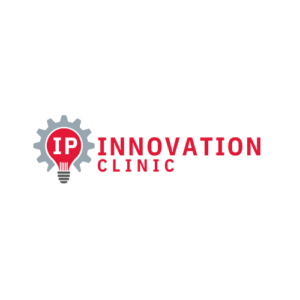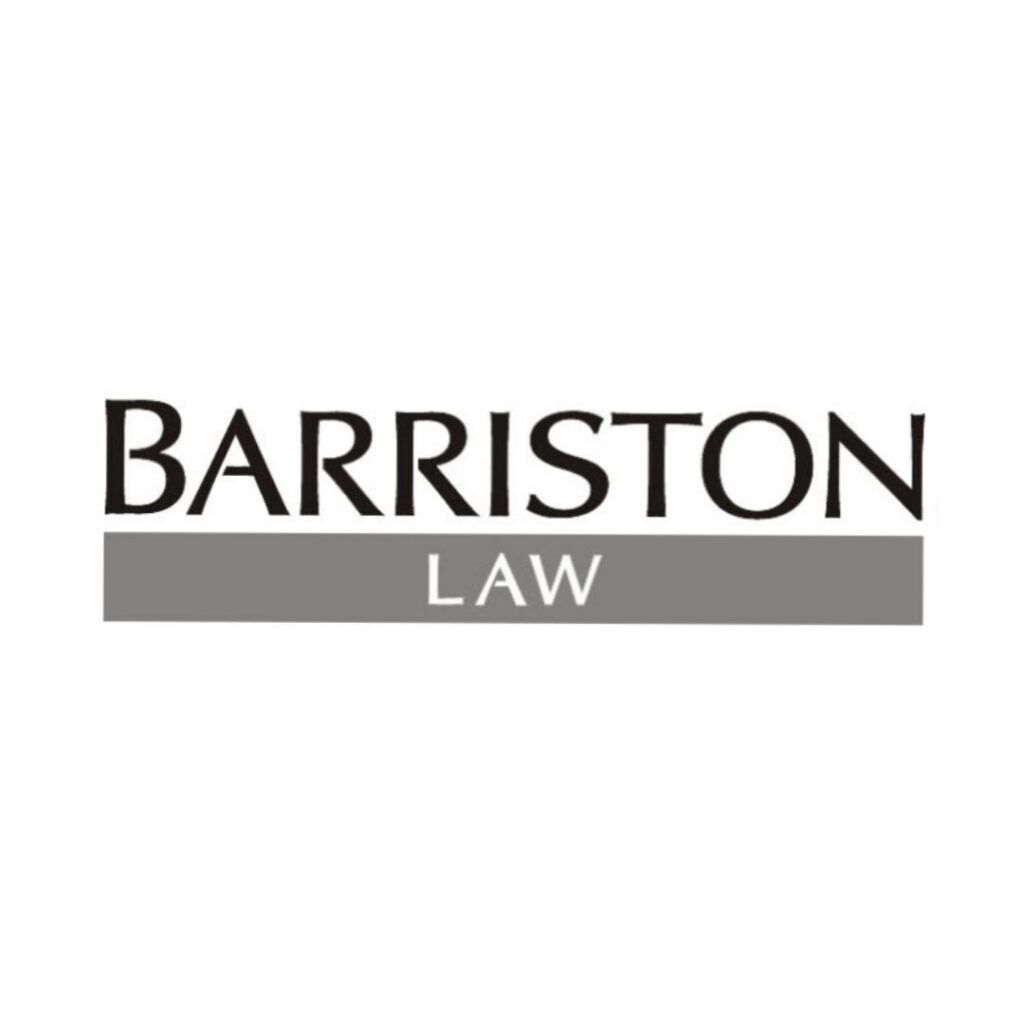What is intellectual property?
IP and data are now the world’s most valuable business and national security assets. This is best evidenced in the steady change of the Standard & Poors 500 Index (S&P500) over the last four decades.
As shown in Figure 1, in 1975, about 17% of the value of the S&P500 was intangible assets, whereas today intangibles comprise over 91% of the S&P500 (Ocean Tomo, 2015) to the total of $22 trillion total in value (The Globe and Mail, 2019), and tangible assets account for only 5% of the total value of the world’s five most valuable companies.
Why is Intellectual Property Important?
- Competitive Advantage
- Liability Concerns
- If you decide to protect it, do it now!
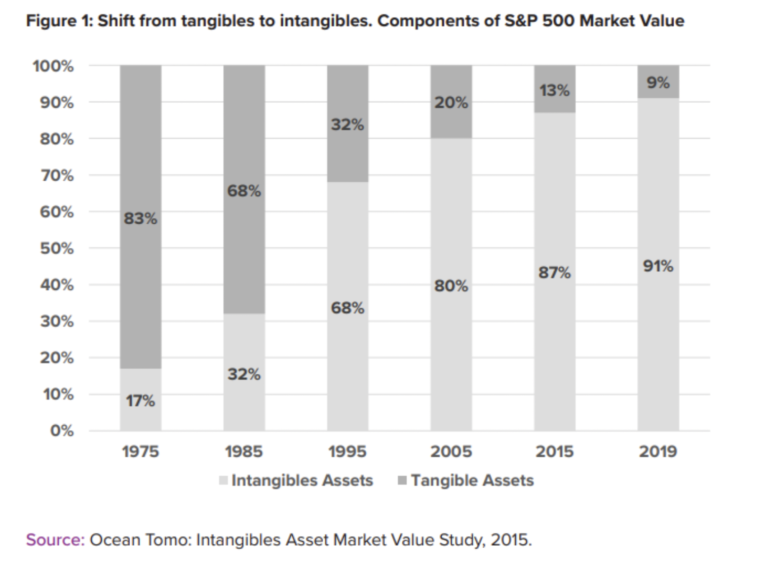
What is a Trademark?
- Trademarks in Canada can include words, designs, tastes, textures, moving images, mode of packaging, holograms, sounds, scents, three-dimensional shapes, colours, or a combination of
- Can trademark any name, logo, design or expression that is used to distinguish a commercial goods or services from others in the marketplace
What can you not register as a Trademark?
- Names and Surnames
- Clearly Descriptive Marks
- Deceptively misdescriptive marks
- Geographic origin of product
- Words in other languages
- Confusing with Registered Trademark
Trademark vs. Trade/ Business Name
- Trademarks are to be distinguished from business names
- Where trade name is the name of your business, it can be registered under the Trademarks Act – must still be used to identify goods or services
- Ex: Coca Cola is trademark, Coca Cola Company Canada Limited is the name of the business
Trademarks Can Be Registered/ Unregistered
- Registered Trademarks provide benefits:
- Rights of exclusive use and protection across Canada
- 10 years of protections (renewable)
- Essentially, you can have a trademark that lasts forever, unlike a patent or copyright that expires after a period of time
Trademark Timeline & Cost
- The entire application process, can take anywhere from 18 months to 2 years if there are no objections from an examiner or oppositions to the application
- Comparatively Low cost
- Getting started….
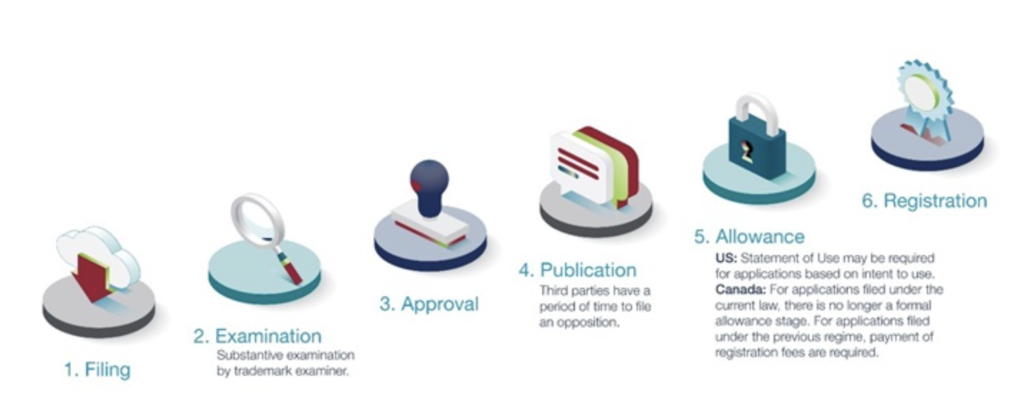
What is copyright?
As an entrepreneur…do you have any IP assets that need copyright protection?
Well, if you have any of the following, original literary works (computer programs), musical works, architectural works, artistic works, dramatic works, sound recordings, etc., you may need copyright protection.
Since copyright protects original works!
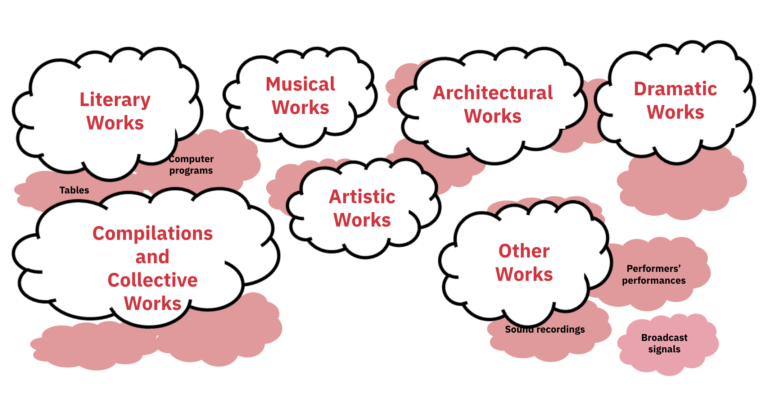
How is copyright created?
Originality is the primary requirement. For the copyright purpose, the work must require you to have exercised skill or judgment and make some intellectual effort to make it novel and unique to some extent.
In addition to originality, the work that requires for copyright protection has to be concrete and non evanescent, so no copyright in live television broadcast!
The best part about copyright is, once a protectable work is created, its copyright is deemed to exist! In other words, no registration or publication or other action is require. NO COST!
However, you do gain some benefits from registration. If you register your copyrights, it creates a public record of ownership. For example, in the US, you’d better register This is because a copyright owner cannot file a lawsuit to enforce or protect its copyrights until the U.S. Copyright Office has issued a registration.
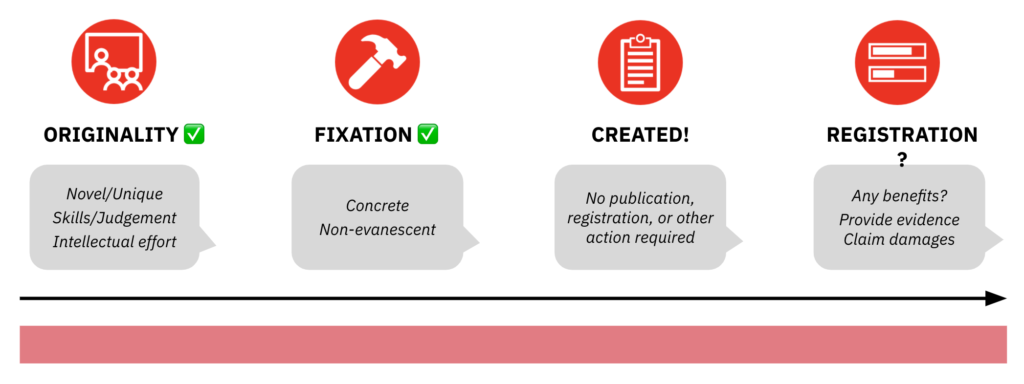
What are some common mistakes start-ups make when it comes to copyright?
The most common mistake by startups is failing to obtain proper written assignments or licenses of intellectual property rights that are developed by the founders prior to the startup’s incorporation or rights developed either by employees or consultants after the startup’s incorporation.
If a startup does not actually own or have a license to the intellectual property in its products, a disgruntled founder or employee can hold the startup hostage until the company either revises the product to remove his contributions or makes a deal to obtain assignment or license of the rights.
A very common form of this problem is the failure to obtain the assignment of the intellectual property rights to the product developed by the founders either prior to incorporation of the startup or prior to the founders becoming employees of the startup. This mistake can be very expensive to resolve; in some situations, it can be fatal to the startup when it’s seeking investment or about to be acquired.
What are trade secrets?
- A way to protect your patent – can be enforced in an agreement (remedy of breach of contract) or breach of confidence action
- No statutory framework, a completely common law concept
- Can only have Intended use of a trademark or copyright can itself be a trade secret
Why or when are they important?
- Depends on the field – biotechnology players are highly regulated, most of the value and growth of companies is derived from patent portfolio
- Alternatively, protecting IP with trade secrets requires a plan on how the trade secrets will be effectively protected.
- Rapidly advancing fields- ex. software providers
Pros and Cons of Trade Secrets
- Pros – quicker and cheaper, not limited in time, does not require compliance with legislation
- Cons – enforcement
- If someone can reverse engineer the secret – no remedy
- Once the secret is made public, anyone may have access to it and use it at will.
- A trade secret may be patented by someone else who developed the relevant information by legitimate means.
- A trade secret is often more difficult to enforce than a patent. The level of protection granted to trade secrets varies significantly from country to country, but is generally considered weak, particularly when compared with the protection granted by a patent.
- Requirements to prove elements of trade secrets, how it was acquired by the D, that the secret was actually used by the D, etc.
Thomas Marshall Exports (1979 UK) – Sets out four elements which help discern a trade secret:
- The information must be such that the owner believes that the release of it would be injurious to him or advantageous to his rivals or others.
- The owner must believe that the information is confidential or secret.
- The belief in 1 and 2 above must be reasonable.
- The information must be judged in light of the usage and practices of the particular industry or trade concerned.
What is a patent?
- New, inventive and useful
- Think about prior disclosure
- BE EARLY AS POSSIBLE FOR PATENT
- Patent protection may be unavailable -too abstract or too obvious of an idea to patent
- Assists in Financing – while both are helpful, patents provide “signalling function” – identifying the value of technological assets, depends on the extent that the benefit to startups of holding patents for financing and exit is driven by signalling value, then trade secrets may not afford these benefits.
THIS IP CONTENT HAS BEEN PROVIDED BY IP INNOVATION CLINIC FELLOWS RYAN ERDMAN, ESTHER RUAN, AND JUNGHI WOO.
Ip lunch club: live replay
IP Innovation Clinic & Sandbox Centre held virtual info sessions throughout the month of March across a wide range of topics that aid you in making sure your business, idea, or product is protected. Thank you to Barriston Law for being the presenting partner of this series! Barriston joined these sessions to offer some local insights on how they are supporting the business community with IP protection and commercialization.
In Part 1 of 3, be guided through an introductory session that will highlight general IP considerations for companies in relation to copyright, patent, and trademarks. Exploring the basics! If you want to ensure your rights are protected, the team will provide you with suggestions on legal cost considerations and tactics to grow your business using a legal strategy.
During the presentation there were a couple of resources mentioned by the IP Innovation Clinic team you can use right away:
- IP Innovation Clinic Chatbot – receive quick answers to basic IP information and assistance with IP related matters.
- IP Innovation Clinic Intake Process – become a client of the pro bono clinic.
- Canadian Intellectual Property Office – additional information as it relates to applying and filing to trademarks and patents in Canada
https://youtu.be/HOj9_Ngadpc
Thank you to our sponsors & partners of this series
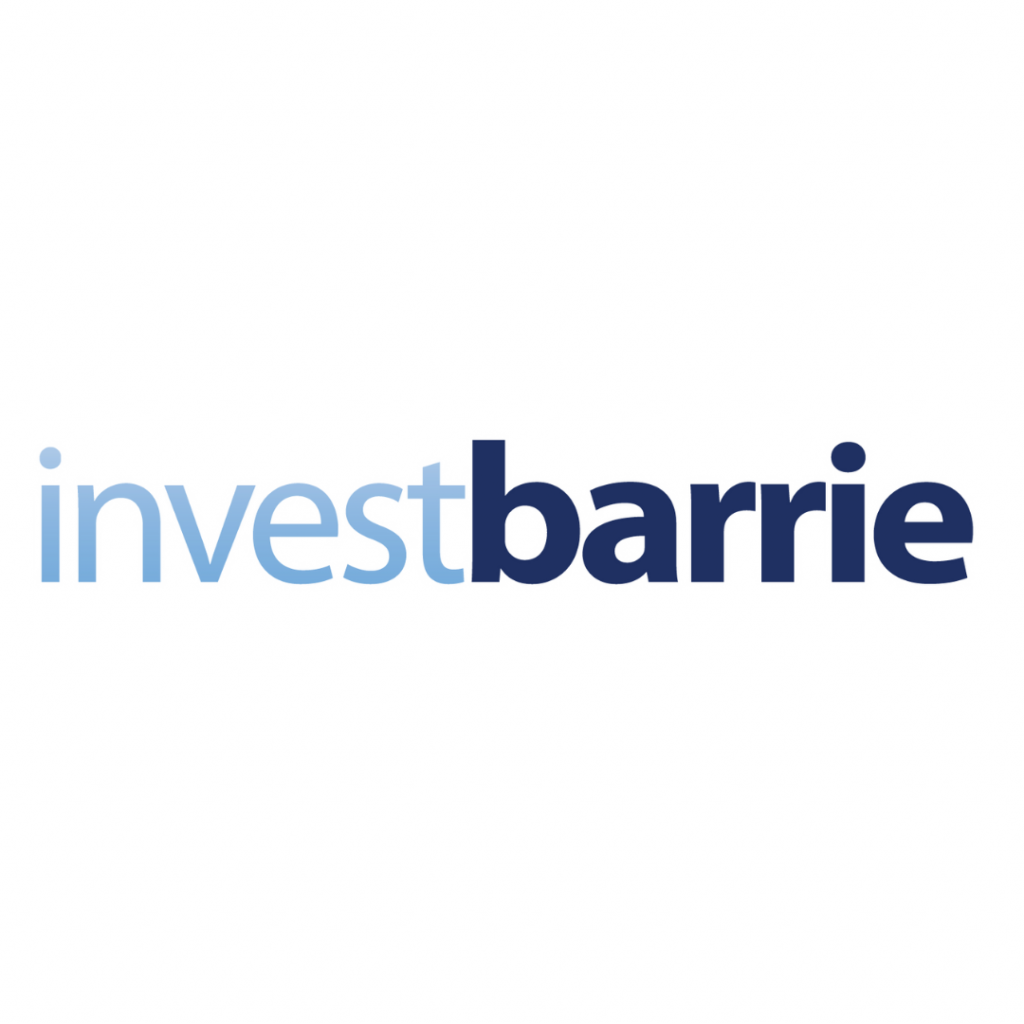
SHARE WITH YOUR NETWORK!
Share on facebook
Facebook
Share on twitter
Twitter
Share on linkedin
LinkedIn

